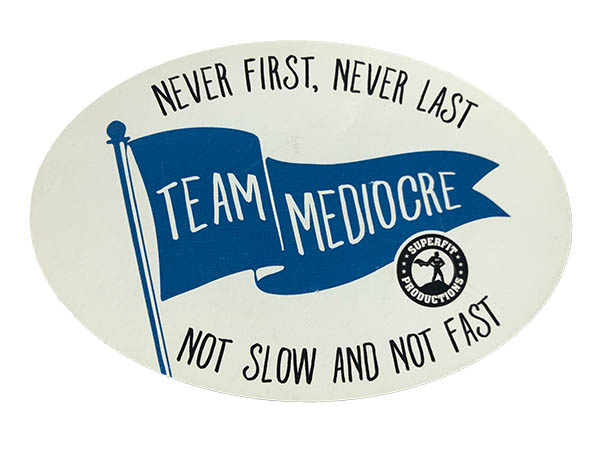We shouldn’t have stopped running. The muscles in my legs hardened, and my hands froze into two numb stumps thanks to hours of swinging through cold air. I wondered how we would start again after snapping a photo, but the moment deserved commemoration. I had run farther than I ever had before— by 2 full miles— and Ellen was back in the game after a 10-year hiatus from distance running. Our time wasn’t impressive, but we felt really good about our uninspiring performance. After all, we were proud members of Team Mediocre.
Hatched by a high-desert runner out of Oregon named Dave Thomason, the Team Mediocre anthem, commemorated on a sassy little sticker, provided the perfect perspective—the only perspective, really, that would allow us to have it all.
For me having it all meant staying sane during a time of intense transition. Within a three-month span, I would juggle two jobs, move across the state, start renovating a house, and support my partner in finishing his PhD.
Oh yeah, and get married. I hated to admit it, but the wedding stressed me out the most. My body was going to be center stage, wrapped in a thin veil and elegant lace. Despite efforts to relax, the expectations still baffled me. I was supposed to look more beautiful than I ever have before while hosting the biggest party I’ve ever thrown to commemorate vows that are nearly impossible for any human to keep.

While it might seem counterintuitive to add one more big thing—my first marathon— to the crazy mix, the habit of running, of showing up several days a week for myself, was the key to holding it all together. I needed a practice that would ground me. All the multitasking and anticipation sent my thoughts spiraling out in a thousand different directions, and I had to tether my mind to my body. I longed to get worn out physically to calm the mental gymnastics. Running was not just one more thing on a brimming plate; running was the solution to a stage of life.
The Spokane marathon was only nine weeks away by the time I decided to run the race, so the recommended 16-week training plan was out of the question. That was fine by me. I wanted to run the least amount of miles possible, and just enough to get me over the finish line. But I didn’t want to do it alone. As things got busier, I knew it would get harder to manage the discipline of 18-mile training runs.
But how do you make that pitch to your running partner? How do you ask someone else to be mediocre, and aim for less than her best, with you?
I shared my unexceptional intention with Ellen over beer at a local brewery. She handed me the Team Mediocre sticker that her buddy Dave had designed and assured me that mediocrity fit the context of her busy life, too. We agreed to squeeze in two mid-week runs alone and meet on Friday mornings for long runs together. We would check in each week to make sure the build up of miles still felt good. We would wait until the last day possible to sign up for the race, to make sure our lives still aligned and our bodies were up for it. We built the equation on grace, and either partner could bail at any time for any reason.
It would be my first time signing up for a race and intentionally choosing—from the outset—not to do my best. It felt strange, but also liberating. I didn’t have to go sub-four hours on my first marathon. I could just show up and run.
This perspective turned out to be a much-needed reset for my type A brain. Competition, with another person or with myself, had been the supreme motivator. I had wanted to change this for a long time, but I could not figure out how to discard the old ways of thinking—don’t slow down; don’t suck; be better. But I could gradually replace the inner dialogue with new thoughts: never first, never last; not slow and not fast.
The morning of the race arrived, cold and calm. Ellen and I limped to the starting line. We had both sustained acute but non-running-related injuries that week. It probably would have been best to stay home—after all, we weren’t that well prepared. But we decided to approach the race with the same leisure and grace as our training runs. We figured we could commit to a really slow half marathon and just see how much longer we could hang on after that. “The thing about Team Mediocre,” I said to Ellen, “is we have the dignity to get shut down on the course.”
I love that photo at mile 20 because it reminds me that, for the first 85 percent of the race, we cruised; we ran faster than we thought we would. We were doing really well for a while. But by mile 22 the knee that I wasn’t supposed to run on deteriorated from tender to unstable with sharp pain.
Fortunately, we had trained for this. No athlete likes to slow down and likes even less slowing her partner down. But we listened to my body, put on the brakes, and hobbled across the finish line with a crowd of unexceptional runners, getting exactly what we came for. Team Mediocre for the finish. //
Summer Hess is managing editor of Out There Outdoors. A long-time swimmer and climber, she recently took on the goal of becoming a mediocre distance runner.













